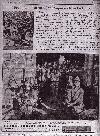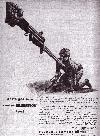Wars do not occur in a vacuum. There are based on the culture of the countries that are at war. The culture of the country that started the war and the culture of the country that is opposing the other country. This will determine the "whys" of a countries actions.
For example, why would Japanese soldiers voluntarily kill themselves as they did in the kamikaze attacks? If a person understands the history and culture of Japan, then the reasons become understandable. Whether we personally agree with the motivations is irrelevant; it's the way history happened, period.
Likewise the way the countries react to war. The United States people had a very different reaction to the Japanese than they did to the Germans, much of it centered around two factors: first, the bombing of Pearl Harbor and second the lack of understanding of Japanese history and thought patterns that Americans had at the time. In a day where J-Pop music, Japanese doramas and Hello Kitty are taking the world, and the U.S., by storm, it's hard to fathom a time when the Oriental mind was totally the "other", inscrutable as the popular word of the time goes.
A lot of the culture is reflected in the mass media of the times including films, radio broadcasts and newspaper and magazine articles and ads. In this section I will be examining a variety of material to help show how the Americans thought about the Japanese at the time and how this affected the war including the decision to use the atomic bomb.
General
The following are from the book Before the Bomb: How American Approached the End of the Pacific War, 1997:
"Dispositions toward the Japanese that had been common throughout the war remained pervasive after V-E Day. The Japanese were considered inherently savage, hopelessly irrational, and often depicted as animals. Susceptible to these stereotypes because of racial prejudices and general ignorance about Japan, many people sought vengeance for Japan's surprise attack on Pearl Harbor and for atrocities committed against American troops by Japanese soldiers."
"By May 1945, numerous commentators on the home front still expressed uncompromising hatred toward the Japanese yet desired that the war be ended quickly."
"During the war, civilians' antipathy for the enemies in Europe often focused on individuals such as Adolf Hitler, Benito Mussolini, and prominent Nazis. Not so with regard to the Japanese. Although commentators and cartoonists ridiculed and scored Japanese leaders such as Gen. Hideki Tojo, prime minister of Japan from 1941 to 1944, and Emperor Hirohito, hatred of the enemy in the Pacific tended to be directed against the Japanese people."

This is an article from the July 23, 1945 issue of Newsweek examining how the Japanese regarded the Emperor.
A good example of this is in the cartoon Tokio Jokio, where Tojo is pictured fixing a sandwich. Yamamoto is also made fun of in the same cartoon.
Other statements about Japanese
"Americans seldom regarded Germans as inherently treacherous or evil as they did the Japanese."
"The fury roused by the Japanese attack on Pearl Harbor cannot be overestimated."
A good example of this is in the movie short "Avenge December 7", used to sell war bonds.
"The use of the pejorative terms ‘Jap' and ‘Nip' was omnipresent. Dehumanization of the Japanese continued unabated after V-E Day. Hardly a rally point by 1945, dehumanization appeared more a justification for killing any and all Japanese, soldiers or civilians."
A cartoon example of this very principle is in "Bugs Bunny Nips the Nips," and "You're a Sap Mr. Jap", a Popeye cartoon.
There's a long history of name-calling those who we don't like, and such terms have been applied to a wide variety of people including Blacks, Jewish, Polish, Italian, Native Americans and a others. Such name calling is still done today, of course. It's just the particular group of people that changes over time, not the viciousness of the name-calling.
"The often abominable behavior of Japanese soldiers throughout Asia-and the abuse of American prisoners in particular-angered Americans and reinforced stereotypical views of all Japanese as bestial savages."
There are good examples of this in my section on posters, here.

An article from the April 17, 1944 issue of Newsweek about Japanese propaganda trying to make it appear that they treat prisoners well.
Reports of atrocities were blocked by the U.S. government which wasn't sure how the handle them. Eventually the information was released after V-E Day. The book notes that it wasn't exactly a coincidence that the reports, which the government knew would get people angry, were released at a time when people were getting tired of the length of the war.
"Atrocity accounts reconfirmed the belief of innate brutality in all Japanese, angering Americans and probably reinforcing the approval of any means of waging war against them. Indeed, the government cited atrocities as justification for incendiary bombing and later for the use of atomic bombs."
An article from the February 7, 1944 issue of Newsweek talking about the Bataan death march, one of events of World War II that really stirred up a lot of negative reaction. Notice in the middle paragraph on the first page that the Joint Chiefs of Staff ordered the story actually suppressed, although it was later released as the article notes. NOTE: It's not a pretty article to read. If you are squeamish, don't read it!
(Also, information on Unit 731, which worked on biological warfare and performed hideous experiments on people, was suppressed by the government and was not even a part of the Tokyo War Crimes Trials since we gave those involved immunity from prosecution in exchange for the data gathered from their experiments.)
"The genesis of the idea that the Japanese were an inscrutable people...can be traced to the writings of Jesuit missionaries in the sixteenth century...As an explanation of Japanese aggression, numerous anthropologists postulated that all Japanese possessed an inferiority complex."
"Belief in an unfathomable Japanese mentality resistant to reason spawned conjecture that the Japanese would have to be annihilated."
An article examining the Japanese mentality, as seen by the U.S. It's from the July 2, 1945 issue of the Newsweek.
St. Louis Post Dispatch: "The war with our savage and malevolent Japanese enemy must be pressed with even greater energy to a victorious finish."
Ernie Pyle, war commentator: "the Japanese were looked upon as something subhuman and repulsive; the way some people feel about cockroaches or mice."

An ad from the November 27, 1944 issue of Newsweek. This appears to be as if you are trying to get some kind of vermin under control, only in this case the vermin are the Japanese soldiers.
Allen Nevins, historian: "Probably in all our history no foe has been so detested as were the Japanese. Emotions forgotten since our most savage Indian wars were reawakened."
Life, May, 1945 editorial: "Americans had to learn to hate Germans, but hating Japs comes natural-as natural as fighting Indian wars once was."
Atlanta Constitution essay: "...nothing to indicate that we won't literally have to eliminate them from the face of the earth before they ever cease fighting."
Admiral Frederick C. Sherman: "They are a brutal, savage, vicious race and I think the world would be a lot better off if a good many of them were exterminated."

An article from the July 9, 1945 issue of Newsweek examining how the Japanese soldier is trained. One reason given for the brutality of some of the soldiers has been their training.
New York Times reference to Japan as a "...a nation more savage, more fanatical, more cunning, more indoctrinated with the notion of its own racial superiority, more impregnated with hatred of all foreigners, and above all far more ready to fight to the last man and die than the Germans ever were."
Life magazine: "...the war-making power of every Japanese resource, every Japanese man, woman and child, must be destroyed."
Admiral Jonas H. Ingram, commander U.S. Atlantic Fleet: "If it is necessary to win the war, we shall leave no man, woman or child alive in Japan and shall erase that country from the map."
Advertisements using the stereotyped view of the Japanese
Main Index
Japan main page
Japanese-American Internment Camps index page
Japan and World War II index page
align=center>Japan main page